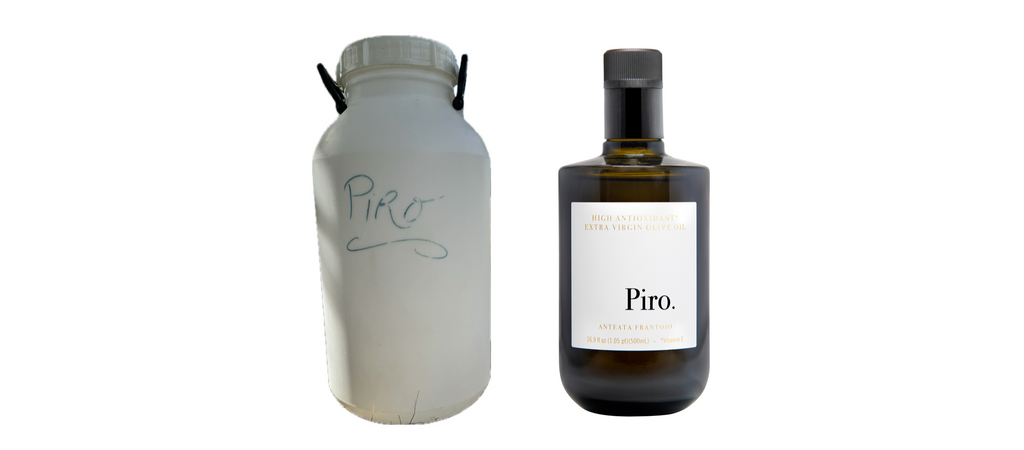
Let's uncover the story of the Piro signature bottle, a humble yet intriguing tale that led to the naming of our brand of ultra-fresh Extra Virgin Olive Oil after our family name, Piro.
Our story starts in Tuscany in the early 2000's during the olive harvest season, which typically spans October and November. Olive groves across the region are abuzz with activity, as families, big and small, embark on the annual ritual of collecting olives to make their year's supply of olive oil. In this narrative, we'll explore the practical reasons behind the Piro bottle and why it carries our last name, which has become synonymous with our extraordinary olive oil.
In rural Tuscany, every family has their own olive trees, and it's an age-old tradition to make olive oil for the year ahead. Even Romain Piro and his family, who consume a significant 50 liters of olive oil annually, were no exception. To meet their needs, Romain had to harvest 20 to 30 trees every year, and let me tell you, it's a lot of hard work!
The process begins with spreading a net under the tree, securing it to prevent any olives from being carried away by the gusty October winds. Then, armed with combs and sometimes extended tools, they set about combing the branches, causing olives and leaves to drop onto the net. It is not an easy process, as the olives harvested at this stage are unripe and not easy to dislodge. And a word of advice, never taste one of those freshly harvested olives—they're incredibly bitter!

Once the tree is stripped of its fruits, the olives are collected, and the leaves and branches are separated as much as possible before being placed in small crates. This helps prevent the olives at the bottom from getting crushed by the weight of those on top. Then it's off to the next tree!
The excitement builds as the day progresses, and the harvest is brought to the olive mill. Timing is everything here because the sooner the olives are processed, the better the quality of the oil. At the mill, crates are weighed, and the cost of milling is determined by the weight. This is why meticulous care is taken to remove any unnecessary material that would add extra weight to the bill.
The milling process itself is swift, taking less than two hours. This means that olives picked in the morning can be transformed into Extra Virgin Olive Oil ready to grace your dinner table by evening. It's a feeling of accomplishment and immediate gratification.

When delivering the olives to the mill (the Frantoio), crates are typically marked with the name of the farm (or "Podere" in Italian), and the containers brought in to receive the Extra Virgin Olive Oil of the day are marked with the name of the farmer. That's how Romain returned home each night with Extra Virgin Olive Oil jugs labeled "Piro."
Now: Jump forward to 2019...
When the time came to name their revolutionary ultra-fresh Extra Virgin Olive Oil, the choice was clear. Taking inspiration from their personal tradition, they decided to proudly display "Piro" on the bottle. Just as Romain marked his containers at the mill, these bottles now held the essence of Tuscany's olive groves and the dedication that went into producing them.
So, there you have it—the fascinating journey of how "Piro." became more than just a name on a bottle. It represents the freshest Extra Virgin Olive Oil you can find. With every bottle of Extra Virgin Olive Oil Piro, you're not just tasting a product; you're partaking in a tradition and a piece of Tuscany, brimming with the liquid gold that defines the region.
Cheers to the Piro bottle and the stories that made it iconic!

